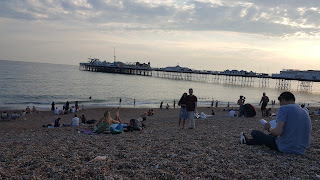Some years back, at a Company do, I opted for the Continental lunch. An European colleague, his plate loaded with paneer butter masala, chicken curry and baby naan, wondered at my choice of what he called "foreign fare". I jokingly responded, "what you have on that plate is as foreign to a Bengali as what I have taken". At that point in time, though, I had yet to find out that there is truly nothing called "Indian food". Traveling through the states of Bihar, Rajasthan, Bengal, Haryana - you name it, the variety is finger-licking amazing.
On a flight back home, after an intensive tour of the Marwar belt of Rajasthan, I just said "no" to in-flight dinner. What I ate over the last few days is easier to capture in words and photographs. What cannot be shared, however, is the warmth with which the food was served, be it at a local Dhaba or a dealer's residence.
My first stop was a home-cooked "feast''. Nothing else could describe the 14 odd dishes that was placed before me. Two smiling young ladies shuttled between the kitchen and the table, with what seemed like an unending line of dishes. I was advised to start the meal with something sweet and wisely ignored the ladoos, cashew and malai barfis to opt for the malai kachori. Then came the main course. Bajre ki roti (a favourite and something I got to eat after many years) accompanied by a variety of dishes, all a first for me. I must be honest, here, the generous helping of ghee on the rotis is something I would like to forget. I reached out first for what looked like the familiar Kari and was told that this is a slightly different dish called dahi-fry (yoghurt fired with spices). The ground turmeric dish with cashews and the Kair Sangari, were not just local but recommended only for winters and signalling that I was a very important guest.
 The next day we stopped at a Dhaba. My colleagues were very concerned that I would not be able to sit at the desi tables - a charpoy, with a wooden plank at the centre. Two people sat bow-legged on either side of the plank, on which the food is served.
The next day we stopped at a Dhaba. My colleagues were very concerned that I would not be able to sit at the desi tables - a charpoy, with a wooden plank at the centre. Two people sat bow-legged on either side of the plank, on which the food is served. The Dhaba owner was briefed the previous day, so we had a proper table set up for us. Seeing his apparent anxiety over the preparations, I didn't have the heart to tell him that I would have enjoyed the charpoy seating (a lost opportunity to showcase how I stay fit with yoga,too). The dishes were slight variants of the previous day's meal.
On this long road journey, we were back at another Dhaba in the evening.
 The bar was raised this time, with the local officer managing a bed sheet as a makeshift table cloth!
The bar was raised this time, with the local officer managing a bed sheet as a makeshift table cloth! The high point of this meal was a special thick wheat roti called tukkad. Business was brisk at this place, as two tourist buses and a couple of trucks stopped by. I recall an explosion of flavours, of freshly cooked veggies, but got too busy eating with my ghee soaked fingers to stop and take some photographs.

The final meal, this afternoon was at a place called Baba Ramdev Restaurant. This time, we shared a couple of tukkads with gatte ki sabzi, tamatar - sev ki sabzi and the, by now, familiar dahi -fry. With all these meals, the garlic chutney, sugarcane jaggery bits, gond (guar gum) ladoos and glasses of buttermilk, need a special mention.
The restaurant manager, at the last place, was friendly. No, the demonetisation had not hurt their business much. As he philosophically put it "people may opt for one less roti, curry or ghee but eat, they have to"! As we rushed out of the place I forgot to check whether the Baba Ramdev name has added to their business with his ever growing showcase yoga and Patanjali fame.
Somethings you save for another visit, another time!





